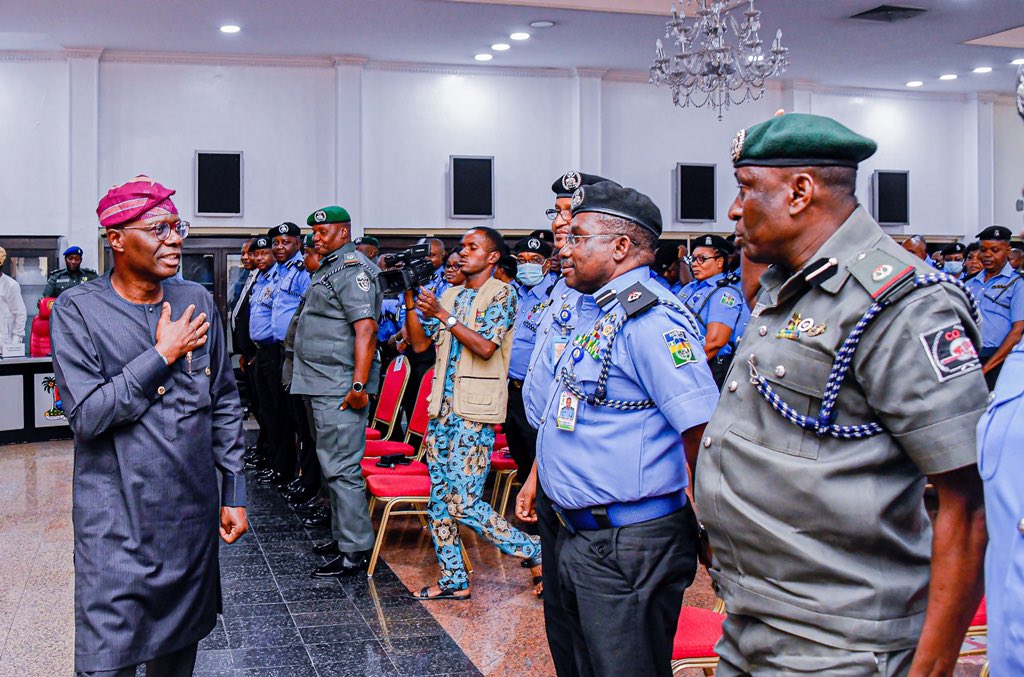By Segun Ajayi

At the time the South West Security Network (SWSN) birthed the Amotekun corps in 2020, not a few Nigerians were suspicious of the perceived “aloofness” of Lagos State to the setup. The suspicion was fuelled by the fact that a South West regional security outfit without Lagos detracts from the spirit and collective aspirations of a people of the same ancestry.
One can actually connect with such anxieties given the status of Lagos as the economic hub of the South West which potentially positions her as a leading light in project initiation and implementation in the region. Meanwhile, Amotekun corps has been in operation in five states in the region even as Lagos keeps faith in her 6,000-men strong Neighbourhood Watch. Although not a policing force in its strict sense, the Neighborhood Watch,according Governor Babajide Sanwo-Olu, is an intelligence gathering outfit that complements the multi-layer security architecture of Lagos. So, having an Amotekun in Lagos,according Sanwo-Olu, amounted to duplication of roles.
That may change with ongoing deliberations between theFederal Government and concerned stakeholders over the creation of State Police. Just like his counterparts across the country, Sanwo-Olu had raised the concern over the low numberof policemen across the country. He observed that engagingmore Nigerians through community police scheme would createanother level of employment while also meeting the constitutional responsibility of protecting lives and property, ensuring peace and tranquillity within the states.
And for a sub-national with inclination to be at the frontline, Sanwo-Olu assured that the state won’t be caught napping by the time the policing system is freed from legal and constitutional entanglements. So, how do Lagos key into the multi-level policing system by the time Federal Government give its final nod?
The governor Sanwo-Olu dropped the hint during a media chat in Lagos recently noting that the Neighborhood Watch would be at the centre of a process that would culminate in the State Police. The question had bothered on government’s lack of capacity to enforce some of its laws spelt out in the state’s rent edict and environmental laws, for example. It was the governor’s response that dovetailed to the desirability of state policing in a mega city like Lagos. He said: “The beauty of any of any law is to ensure there are consequences to violations of the law. But when you don’t have institutions or capacity to enforce laws fully, we’ll begin to see people not obeying such laws fully. This is why this conversation will tilt towards request for state police for example”.
In Sanwo-Olu’s estimation, he would have loved to assemble50,000 policemen to police Lagos. But for a start, he enthused, “the Neighbourhood Watch is still there and they are about 6,000. I’ve given approval to recruit 4,000 more. Hey! These are jobs for our youths, jobs for our able-bodied men……what this means for me today is that by the time a final approval is given for the operations of State Police, I’ll have 10,000 men to train and get them ready”. According to him, effective policing can be better achieved when intelligence gathering is localised
By inference, security personnel recruited locally have better understanding of the environment, know the people, the dark spots and happenings around them. Sanwo-Olu strongly believes the transmutation of Neighbourhood Watch into a proper security force, armed with all the apparatus of state government will hit the ground running.
Lending his voice to the raging debate over the desirability of state police amid fears that some governors could turn them to instruments of coercion, constitutional lawyer, Prof. Mike Ozekhome said: “Like we have it in western democracies, governors must fully fund state police commands. State Police Commissioners must also be independent of IGP (Inspector General of Police). There must also be a collaboration with federal and state police for effective policing”. The Senior Advocate of Nigeria spoke further: “I strongly suggest a Constitutional review to insist that governors must not deploy police to intimidate or harass political opponents. The new state police must also be fully kitted with modern gadgets, vehicles and crime-fighting equipment”.
Corroborating Ozekhome, the Director General of the International Institute of Professional Security, Dr. Tony Ofoyetan while on a TV programme, endorsed government’s move to allow state policing. While he admitted the exercise could be fraught with challenges like funding in addition to the fear some governors would turn state policemen to instruments of coercion, these likely shortcomings can’t obliterate the gains. He argued that many states are funding one form of para-military outfit or the other. But, the difference is that they don’t bear arms. As for the fear of some governors using state police to hunt opposition elements, Ofoyetan argued that even with the current arrangement, some dictatorial governors still have state police formations at their beck and call.
If State Police becomes constitutional in Nigeria, Lagos is indeed ready.